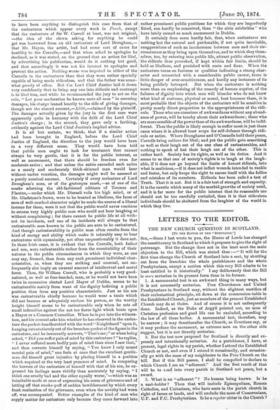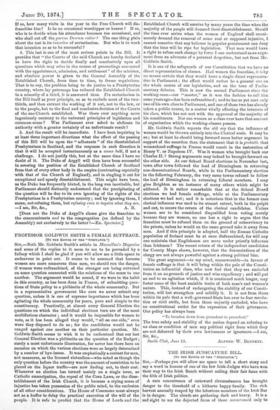LETTERS TO THE EDITOR.
THE NEW CHURCH QUESTION IN SCOTLAND.
(TO THE EDITOR OF THE "SPECTATOR.")
SIR, —Since I last wrote to you, the House of Lords has changed the constituency in Scotland to which itproposes to give the right of patronage. But the change does not in the least meet the main objection to the Bill, which was stated thus :—" It will for the first time change the Church of Scotland into a sect, by shutting out from the franchise the whole parishioners and the whole Presbyterians, except a section which this very Bill admits to be least entitled to it historically." I say deliberately that the Bill is more sectarian in its present form than in its former.
1. A sacramental test is an awkward thing in many ways, but it is not necessarily sectarian. Free Churchmen and United Presbyterians in Scotland may, without the slightest sacrifice of their ecclesiastical principle, sit down at the communion-table in the Established Church, just as members of the present Established Church may do at theirs. And of course it is not unfrequently done. Indeed, as the Duke of Argyll pointed out, no man of Christian profession and good life can be excluded, according to the law of all these bodies. A sacramental test, therefore, may be narrow ; it may denationalise the Church, as Erastians say, or it may profane the sacrament, as extreme men on the other side suggest, but it is not directly sectarian.
2. But the test now proposed for Scotland is directly and ex- pressly and intentionally sectarian. As a parishioner, I have, at present, legal rights in my parish, whether I attend the Established Church or not, and even if I attend it occasionally, and occasion- ally go with the mass of my neighbours to the Free Church on the hill. But if this Bill passes, I shall be compelled to declare to which Church I am an "adherent." And the first result of that If so, how many visits in the year to the Free Church will dis- franchise him? Is he an occasional worshipper or hearer ? If so, who is to decide when his attendance becomes too occasional, and who shall cut off the parcus Deorunt cultor ? The one thing plain about the test is its intention of sectarianism. But who is to work that intention so as to be successful ?
4. This last is one of the most serious points in the Bill. It provides that "the Courts of the said Church are hereby declared -to have the right to decide finally and conclusively upon all questions which may arise in the course of proceedings connected with the appointment, admission, and settlement" of the minister, and absolute power is given to the General Assembly of the Established Church, from time to time, to frame regulations. That is to say, the problem being to do justice to a Presbyterian country, where lay patronage has reduced the Established Church -to a minority of a third, it is answered thus. Fix sectarianism in -the Bill itself as your principle, so as to exclude most of the two- thirds, and then entrust the working of it out, not to the law, or to the people, but to the final and conclusive decision of the Courts of the one Church established. Was there ever anything more ingeniously contrary to the usiversal principles of legislation and -common-sense ? Was Parliament ever asked to abdicate its -authority with a greater certainty of an unfortunate result ?
5. And the result will be immediate. I have been inquiring in st least three important directions what the effect of the passing -of this Bill will be upon the " adherents " of the disestablished Presbyterians in Scotland, and the response in each direction is that it will be accepted instantaneously as a casus belli, if not a challenge. I do not justify this, but at the same time I have no doubt of it. The Duke of Argyll will then have been successful in severing the position of the Established Church of Scotland from that of every other body in the empire (contrasting especially -with that of the Church of England), and in singling it out for exceptional and speedy disestablishment. This might have been, as the Duke has frequently hinted, in the long run inevitable, but Parliament should distinctly understand that the precipitating of the question will be due to its own ignoring of the rights of the Presbyterians in a Presbyterian country ; and by ignoring them, I mean, not refusing them, but refusing even to inquire what they are.
—I am, Sir, &c., A. B. [Does not the Duke of Argyll's clause give the franchise to the communicants and to the congregation (as defined by the Assembly) not exclusively to the latter ?—En. Spectator.]



































 Previous page
Previous page